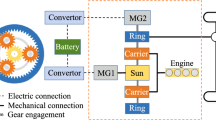Abstract
This paper presents a control design approach for optimizing the comfortability of hybrid electric powertrains in acceleration mode. A parallel hybrid electric vehicle powertrain system with two motors and a single turbo-charged engine is considered. In acceleration mode, it is assumed that the desired acceleration rate cannot be satisfied by using the electrical motor individually. The first challenge is managing the combustion engine to assist power generation and power split such that the system satisfies comfortability, and the second challenge is modeling the comfortability (e.g., analytically describing the human feeling). This paper exploits a black-box module typically used in the automotive industry to quantitatively evaluate comfortability. A genetic algorithm is applied to find the optimum power split and gear schedule that can improve the comfortability evaluated by the module in acceleration mode. The simulation results conducted on a simulator with a practical background demonstrate the significance of the proposed design approach.
Similar content being viewed by others
References
Gao J W, Li M, Hu Y F, et al. Challenges and developments of automotive fuel cell hybrid power system and control. Sci China Inf Sci, 2019, 62: 051201
Chu H Q, Guo L L, Yan Y J, et al. Energy-efficient longitudinal driving strategy for intelligent vehicles on urban roads. Sci China Inf Sci, 2019, 62: 064201
Malikopoulos A A. Supervisory power management control algorithms for hybrid electric vehicles: a survey. IEEE Trans Intell Transp Syst, 2014, 15: 1869–1885
Zhang J Y, Inuzuka S, Kojima T, et al. Dynamical model of HEV with two planetary gear units and its application to optimization of energy consumption. Sci China Inf Sci, 2019, 62: 222203
Vinot E, Trigui R, Cheng Y, et al. Improvement of an EVT-based HEV using dynamic programming. IEEE Trans Veh Technol, 2014, 63: 40–50
Sun C, Sun F C, He H W. Investigating adaptive-ECMS with velocity forecast ability for hybrid electric vehicles. Appl Energy, 2017, 185: 1644–1653
Han S J, Zhang F Q, Xi J Q. A real-time energy management strategy based on energy prediction for parallel hybrid electric vehicles. IEEE Access, 2018, 6: 70313–70323
Musardo C, Rizzoni G, Guezennec Y, et al. A-ECMS: an adaptive algorithm for hybrid electric vehicle energy management. Eur J Control, 2005, 11: 509–524
Wu J, Wang X Y, Li L, et al. Hierarchical control strategy with battery aging consideration for hybrid electric vehicle regenerative braking control. Energy, 2018, 145: 301–312
Sun C, Hu X S, Moura S J, et al. Velocity predictors for predictive energy management in hybrid electric vehicles. IEEE Trans Control Syst Technol, 2015, 23: 1197–1204
Xu F G, Shen T L. Look-ahead prediction-based real-time optimal energy management for connected HEVs. IEEE Trans Veh Technol, 2020, 69: 2537–2551
Zhang J Y, Xu F G, Zhang Y H, et al. ELM-based driver torque demand prediction and real-time optimal energy management strategy for HEVs. Neural Comput Applic, 2019, 133: 1–19
Liu T, Hu X S, Li S E, et al. Reinforcement learning optimized look-ahead energy management of a parallel hybrid electric vehicle. IEEE/ASME Trans Mechatron, 2017, 22: 1497–1507
Zhang J Y, Wu Y H. A stochastic logical model-based approximate solution for energy management problem of HEVs. Sci China Inf Sci, 2018, 61: 070207
Wang X Y, Li L, Yang C. Hierarchical control of dry clutch for engine-start process in a parallel hybrid electric vehicle. IEEE Trans Transp Electrific, 2016, 2: 231–243
Nandi A K, Chakraborty D, Vaz W. Design of a comfortable optimal driving strategy for electric vehicles using multi-objective optimization. J Power Sources, 2015, 283: 1–18
Geweda A E, El-Gohary M A, El-Nabawy A M, et al. Improvement of vehicle ride comfort using genetic algorithm optimization and PI controller. Alexandria Eng J, 2017, 56: 405–414
Hegazy S, Sandu C. Vehicle ride comfort and stability performance evaluation. JSAE Tech Paper, 2009, 1: 2859
Wang X Y, Li L, He K, et al. Dual-loop self-learning fuzzy control for AMT gear engagement: design and experiment. IEEE Trans Fuzzy Syst, 2018, 26: 1813–1822
Grant P R, Haycock B. Effect of jerk and acceleration on the perception of motion strength. J Aircraft, 2008, 45: 1190–1197
Luo Y G, Chen T, Zhang S W, et al. Intelligent hybrid electric vehicle ACC with coordinated control of tracking ability, fuel economy, and ride comfort. IEEE Trans Intell Transp Syst, 2015, 16: 2303–2308
Tajeddin S, Vajedi M, Azad N L. A Newton/GMRES approach to predictive ecological adaptive cruise control of a plug-in hybrid electric vehicle in car-following scenarios. IFAC-PapersOnLine, 2016, 49: 59–65
Zhuang W C, Zhang X W, Yin G D, et al. Mode shift schedule and control strategy design of multimode hybrid powertrain. IEEE Trans Control Syst Technol, 2020, 28: 804–815
Pathak I, Vidyarthi D P. A model for virtual network embedding across multiple infrastructure providers using genetic algorithm. Sci China Inf Sci, 2017, 60: 040308
Li L, Zhang Y H, Yang C, et al. Hybrid genetic algorithm-based optimization of powertrain and control parameters of plug-in hybrid electric bus. J Franklin Inst, 2015, 352: 776–801
Srinivas M, Patnaik L M. Adaptive probabilities of crossover and mutation in genetic algorithms. IEEE Trans Syst Man Cybern, 1994, 24: 656–667
Acknowledgements
The work of the third author was supported by National Natural Science Foundation of China (Grant No. 61973053). The authors would like to thank Toyota Motor Corporation, Japan, for technical support.
Author information
Authors and Affiliations
Corresponding author
Rights and permissions
About this article
Cite this article
Zhang, B., Zhang, Y., Zhang, J. et al. Optimal comfortability control of hybrid electric powertrains in acceleration mode. Sci. China Inf. Sci. 64, 172201 (2021). https://doi.org/10.1007/s11432-020-2912-2
Received:
Accepted:
Published:
DOI: https://doi.org/10.1007/s11432-020-2912-2




